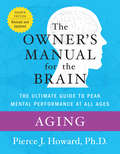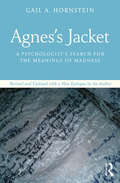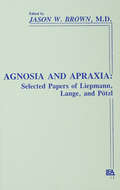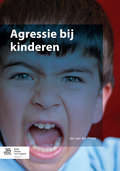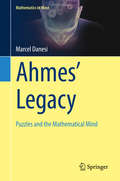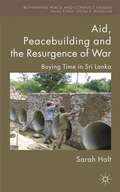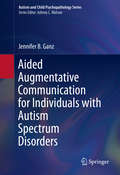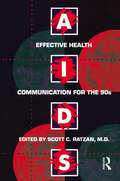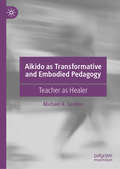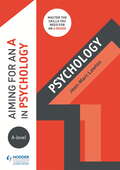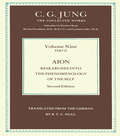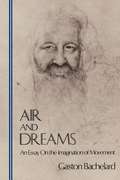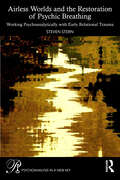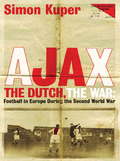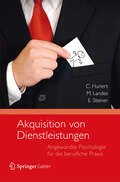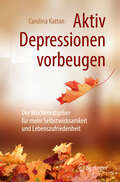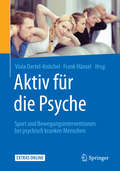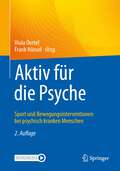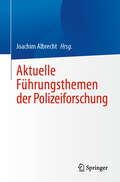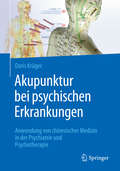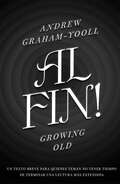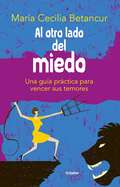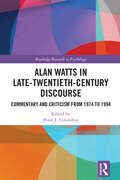- Table View
- List View
Aging: The Owner's Manual
by Pierce HowardCutting-edge, user-friendly, and comprehensive: the revolutionary guide to the brain, now fully revised and updatedAt birth each of us is given the most powerful and complex tool of all time: the human brain. And yet, as we well know, it doesn't come with an owner's manual--until now. In this unsurpassed resource, Dr. Pierce J. Howard and his team distill the very latest research and clearly explain the practical, real-world applications to our daily lives. Drawing from the frontiers of psychology, neurobiology, and cognitive science, yet organized and written for maximum usability, The Owner's Manual for the Brain, Fourth Edition, is your comprehensive guide to optimum mental performance and well-being. It should be on every thinking person's bookshelf. What are the ingredients of happiness? Which are the best remedies for headaches and migraines? How can we master creativity, focus, decision making, and willpower? What are the best brain foods? How is it possible to boost memory and intelligence? What is the secret to getting a good night's sleep? How can you positively manage depression, anxiety, addiction, and other disorders? What is the impact of nutrition, stress, and exercise on the brain? Is personality hard-wired or fluid? What are the best strategies when recovering from trauma and loss? How do moods and emotions interact? What is the ideal learning environment for children? How do love, humor, music, friendship, and nature contribute to well-being? Are there ways of reducing negative traits such as aggression, short-temperedness, or irritability? What is the recommended treatment for concussions? Can you delay or prevent Alzheimer's and dementia? What are the most important ingredients to a successful marriage and family? What do the world's most effective managers know about leadership, motivation, and persuasion? Plus 1,000s more topics!
Agnes's Jacket: A Psychologist's Search for the Meanings of Madness.Revised and Updated with a New Epilogue by the Author
by Gail A. HornsteinIn a Victorian-era German asylum, seamstress Agnes Richter painstakingly stitched a mysterious autobiographical text into every inch of the jacket she created from her institutional uniform. Despite every attempt to silence them, hundreds of other psychiatric patients have managed to get their stories out, or to publish them on their own. Today, in a vibrant network of peer-advocacy groups all over the world, those with firsthand experience of emotional distress are working together to unravel the mysteries of madness and to help one another recover. Agnes’s Jacket tells their story, focusing especially on the Hearing Voices Network (HVN), an international collaboration of professionals, people with lived experience, and their families and friends who have been working to develop an alternative approach to coping with voices, visions, and other extreme states that is empowering and useful and does not start from the assumption that such people have a chronic illness. A vast gulf exists between the way medicine explains psychiatric conditions and the experiences of those who suffer. Hornstein’s work helps us to bridge that gulf, guiding us through the inner lives of those diagnosed with schizophrenia, bipolar illness, depression, and paranoia, and emerging with nothing less than a new model for understanding one another and ourselves.
Agnosia and Apraxia: Selected Papers of Liepmann, Lange, and Potzl (Institute for Research in Behavioral Neuroscience Series)
by Ellen Perecman Jason W. Brown George Dean Emil Franzen Joachim LuwischFirst Published in 1988. The reader is invited to explore this collection of early German papers and not to analyze the work through a comparison with the present but to approach it with a relaxation of bias that extends a new hearing to old ideas. The reader may be surprised to see how little has changed in the association or callosal theory of apraxia since this review by Liepmann. Of interest is the care with which Liepmann studied his patients and the ingenious anatomical accounts.
Agorafabulous!: Dispatches from My Bedroom
by Sara Benincasa“Sara Benincasa is one of the funniest writers I know—and I know a disturbing number of them. She is also one of the most honest.”—Sam Apple, author of American Parent and editor-in-chief of The Faster Times “Sara is extremely funny and should have many books out so we can all read them and laugh.” —Margaret ChoComedian, writer, blogger, radio and podcast host, and YouTube sensation, Sara Benincasa bravely and outrageously brings us “Dispatches from My Bedroom” with Agorafabulous! One of the funniest and most poignant books ever written about a mental illness, Agorafabulous! is a hilarious, raw, and unforgettable account of how a terrified young woman, literally trapped by her own imagination, evolved into a (relatively) high-functioning professional smartass. Down to earth and seriously funny, Benincasa’s no-holds-barred revelations offer readers the politically incorrect hilarity they heartily crave, yet is so often missing from your typical, weepy, and redemptive personal memoir.
Agressie bij kinderen
by Jan PloegAgressie is een probleem waarmee ouders, leerkrachten en hulpverleners dikwijls geen raad weten. Agressieve kinderen en jongeren blijken moeilijk te behandelen. Hoe moet agressie worden aangepakt? Waar komt agressie vandaag? Waarom is het ene kind wel en het andere niet agressief? En blijven agressieve kinderen altijd agressief? Op deze en andere vragen geeft dit boek antwoord. Agressie kan het functioneren van kinderen ernstig belemmeren. Thuis, op school en onder vrienden kan dat tot heftige problemen leiden. Voor opvoeders en hulpverleners is het van groot belang een goed inzicht te krijgen in het verschijnsel agressie. Dat kan helpen agressie een half toe te roepen of te voorkomen dat het agressieve kind steeds agressiever wordt. In de verschillende hoofdstukken belicht de auteur het verschijnsel agressie van begin tot eind. Het boek maakt duidelijk hoe agressie ontstaat, welke ontwikkelingen agressieve kinderen kunnen doormaken en welke oplossingen er zijn om agressie te voorkomen of in te perken. Dit helder geschreven overzichtswerk is bedoeld voor (aankomend) orthopedagogen, psychologen, sociaal-pedagogische hulpverleners, leerkrachten, beleidsmakers en andere professionals die met agressieve jeugdigen te maken hebben of krijgen.
Ahmes’ Legacy: Puzzles And The Mathematical Mind (Mathematics in Mind)
by Marcel DanesiThis book looks at classic puzzles from the perspective of their structures and what they tell us about the brain. It uses the work on the neuroscience of mathematics from Dehaene, Butterworth, Lakoff, Núñez, and many others as a lens to understand the ways in which puzzles reflect imaginative processes blended with rational ones. The book is not about recreational or puzzle-based mathematics in and of itself but rather about what the classic puzzles tell us about the mathematical imagination and its impact on the discipline. It delves into the history of classic math puzzles, deconstructing their raison d’être and describing their psychological features, so that their nature can be fleshed out in order to help understand the mathematical mind.This volume is the first monographic treatment of the psychological nature of puzzles in mathematics. With its user-friendly technical level of discussion, it is of interest to both general readers and those who engage in the disciplines of mathematics, psychology, neuroscience, and/or anthropology. It is also ideal as a textbook source for courses in recreational mathematics, or as reference material in introductory college math courses.
Aid, Peacebuilding and the Resurgence of War
by Sarah HoltAs one of South Asia's oldest democracies Sri Lanka is a critical case to examine the limits of a liberal peace, peacebuilding and external engagement in the settlement of civil wars. Based on nine years of research, and more than 100 interviews with those affected by the war, NGOs, and local and international elites engaged in the peace process.
Aided Augmentative Communication for Individuals with Autism Spectrum Disorders (Autism and Child Psychopathology Series)
by Jennifer B. GanzJust as autism is a continuum of disorders, it is associated with a broad range of neurodevelopmental, social, and communication deficits. For individuals with autism spectrum disorders (ASD), augmentative and alternative communication (AAC) has a major impact on their daily lives, often reducing the occurrence of challenging behaviors. Aided Augmentative Communication for Individuals with Autism Spectrum Disorders is a practical guide to the field, offering readers a solid grounding in ASD, related complex communication needs (CCN), and AAC, especially visual and computer-based technologies. Widely used interventions and tools in AAC are reviewed--not just how they work, but why they work--to aid practitioners in choosing those most suited to individual clients or students. Issues in evaluation for aided AAC and debates concerning its usability round out the coverage. Readers come away with a deeper understanding of the centrality of communication for clients with ASD and the many possibilities for intervention Key areas of coverage include: AAC and assessment of people with ASD and CCN. Interdisciplinary issues and collaboration in assessment and treatment. AAC intervention mediated by natural communication partners. Functional communication training with AAC. The controversy surrounding facilitated communication. Sign language versus AAC. Aided Augmentative Communication for Individuals with Autism Spectrum Disorders is an essential resource for clinicians/practitioners, researchers, and graduate students in such fields as child and school psychology, speech pathology, language education, developmental psychology, behavior therapy, and educational technology.
Aids: Effective Health Communicaton for the 90's
by Scott C. RatzanDespite educational efforts, the majority of Americans are still under the misconception that they are not at risk from HIV/AIDS infection. In addition, the federal government only spends 2% of the total designated federal AIDS funding toward prevention. Thus, information in respect to AIDS and health communication in any comprehensive nature is almost nonexistent.; This book aims to rectify the situation by presenting detailed analysis and actions necessary to confront the AIDS pandemic on every level of the communication realm. Contributors are experienced researchers, educators, government officials, and physicians. They examine the issue from a number of standpoints, including: communication, adolescent medicine, public administration, psychology, journalism, audiology, speech and language pathology, neurological surgery, preventive medicine and public health.
Aikido as Transformative and Embodied Pedagogy: Teacher as Healer
by Michael A. GordonDrawing on the author’s lifelong practice in the non-competitive and defensive Japanese art of Aikido, this book examines education as self-cultivation, from a Japanese philosophy (e.g. Buddhist) perspective. Contemplative practices, such as secular mindfulness meditation, are being increasingly integrated into pedagogical settings to enhance social and emotional learning and well-being and to address stress-induced overwhelm due to increased pressures on the education system and its constituents. The chapters in this book explore the various ways, through the lens of this non-violent relational art of Aikido, that pedagogy is always something being practiced (on the level of psychological, somatic and emotional registers) and thus holding potential for transformation into being more relational, ecological-minded, and reflecting more ‘embodied attunement.’ Positioning education as a practice, one of self-discovery, the author argues that one can approach personal development as engaging in a spiritual process of integrating mind and body towards full presence of being and existence.
Aiming for an A in A-level Psychology
by Jean-Marc LawtonExam Board: AQA, Edexcel, OCR, WJEC EduqasLevel: A-levelSubject: PsychologyFirst teaching: September 2015First exams: Summer 2017Master the skills you need to set yourself apart and hit the highest grades; this year-round course companion develops the higher-order thinking skills that top-achieving students possess, providing step-by-step guidance, examples and tips for getting an A grade.Written by experienced author and teacher Jean-Marc Lawton, Aiming for an A in A-level Psychology:- Helps you develop the 'A grade skills' of analysis, evaluation, creation and application- Takes you step by step through specific skills you need to master in A-level Psychology, so you can apply these skills and approach each exam question as an A/A* candidate- Clearly shows how to move up the grades with sample responses annotated to highlight the key features of A/A* answers- Helps you practise to achieve the levels expected of top-performing students, using in-class or homework activities and further reading tasks that stretch towards university-level study- Perfects exam technique through practical tips and examples of common pitfalls to avoid - Cultivates effective revision habits for success, with tips and strategies for producing and using revision resources- Supports all exam boards, outlining the Assessment Objectives for reaching the higher levels under the AQA, Edexcel, OCR, and WJEC/Eduqas specifications
Aiming for an A in A-level Psychology
by Jean-Marc LawtonExam Board: AQA, Edexcel, OCR, WJEC Eduqas Level: A-level Subject: Psychology First teaching: September 2015 First exams: Summer 2017Master the skills you need to set yourself apart and hit the highest grades; this year-round course companion develops the higher-order thinking skills that top-achieving students possess, providing step-by-step guidance, examples and tips for getting an A grade.Written by experienced author and teacher Jean-Marc Lawton, Aiming for an A in A-level Psychology:- Helps you develop the 'A grade skills' of analysis, evaluation, creation and application- Takes you step by step through specific skills you need to master in A-level Psychology, so you can apply these skills and approach each exam question as an A/A* candidate- Clearly shows how to move up the grades with sample responses annotated to highlight the key features of A/A* answers- Helps you practise to achieve the levels expected of top-performing students, using in-class or homework activities and further reading tasks that stretch towards university-level study- Perfects exam technique through practical tips and examples of common pitfalls to avoid - Cultivates effective revision habits for success, with tips and strategies for producing and using revision resources- Supports all exam boards, outlining the Assessment Objectives for reaching the higher levels under the AQA, Edexcel, OCR, and WJEC/Eduqas specifications
Aion: Researches Into the Phenomenology of the Self (Collected Works of C.G. Jung #56)
by C.G. JungAion is one of a number of major works that Jung wrote during his seventies that were concerned with the relations between psychology, alchemy and religion. He is particularly concerned in this volume with the rise of Christianity and with the figure of Christ. He explores how Christianity came about when it did, the importance of the figure of Christ and the identification of the figure of Christ with the archetype of the Self. A matter of special importance to Jung in his seventies - the problem of opposites, particularly good and evil - is further discussed and the importance of the symbolism of the fish, which recurs as a symbol of both Christ and the devil, is examined. As a study of the archetype of the self, Aion complements The Archetypes and the Collective Unconscious, which is also published in paperback.
Air and Dreams: An Essay on the Imagination of Movement
by Gaston BachelardEssay from one of the most significant modern thinkers in France.
Airless Worlds and the Restoration of Psychic Breathing: Working Psychoanalytically with Early Relational Trauma (Psychoanalysis in a New Key Book Series)
by Steven SternThis book focuses on the recognition and psychoanalytic treatment of a debilitating form of early relational trauma poignantly described by Steven Stern as airless world syndrome. A patient can be said to be living in an airless world when one or both parents have failed to recognize, or worse, actively negated their child’s subjective experience and needs, instead imposing their subjective reality on the child such that the child had no choice but to adopt the parents’ reality as their own. When a child’s mind is captured in this way—what Stern calls identification with negation—the result is an unconscious bondage to the internalized negating other which can be disabling to the senses of self, personal agency, and realness. With extended clinical examples in every chapter, Stern brings the reader into the depths of each patient’s airless world and the co-created needed relationship that ultimately, fitfully transforms it.Written in a detailed yet accessible style, this book is invaluable to psychoanalysts and psychotherapists in practice and in training.
Ajax, The Dutch, The War: Football in Europe During the Second World War
by Simon Kuper'Football history at its best' SCOTLAND ON SUNDAY'Hugely moving... a very good book indeed' FOUR FOUR TWO'Kuper is an original, sophisticated and adventurous writer. The story he has to tell... is fascinating and pressing' SUNDAY TIMESIn FOOTBALL AGAINST THE ENEMY Simon Kuper crossed the globe in search of the links between football, politics and culture. In AJAX, THE DUTCH, THE WAR he skilfully pieces together an alternative account of World War II. He looks at the lives of the footballers who played for the Dutch club, the officials and the ordinary fans during this tumultuous period and challenges the accepted notion of the War in occupied Europe. With almost 80 per cent of Amsterdam's Jewish Corner wiped out during the war, the long-held belief that, by and large, half the Dutch population had some kind of link to the Resistance has, of late, come into question. Kuper explores this issue and looks deeper into the role of football across Europe in the years both preceding and following the War. The result is a compelling and controversial account of the War, seen through the lens of football.
Akquisition von Dienstleistungen: Angewandte Psychologie für die berufliche Praxis
by Miriam Landes Eberhard Steiner Claus HunertErfolgreiche Verkäufer fühlen sich meist als "die Könige" des Unternehmens und dies meist mit gutem Recht, denn sie sind es, die an vorderster Front für den Erfolg des Unternehmens sorgen. Schwierig genug ist diese Aufgabe schon, wenn man ein konkretes Produkt verkaufen soll, aber das bietet wenigstens den Vorteil, dass es der Kunde im wahrsten Sinne des Wortes begreifen, es testen und auf seine Erwartungen hin überprüfen kann, bevor er seine Kaufentscheidung trifft. Die besondere Herausforderung im Verkauf von Dienstleistungen liegt darin, dass man auf der "Klaviatur" der verschiedenen psychologischen Befindlichkeiten, Erwartungen, aber auch Ängste und situativer Besonderheiten auf Seiten seines Kunden zu spielen vermag. Aufgrund angewandter psychologischen Erkenntnisse bietet dieses Werk die nötigen Einblicke für die Praxis. Auch stellt es diese Klaviatur erstmals in umfassender Weise vor und bietet darüber hinaus konkrete Handlungsempfehlungen für unterschiedliche Verkaufssituationen. Somit ist es wertvolle und zugleich ansprechend interessante Lektüre für alle, die aus beruflichen oder privaten Gründen mehr über die psychologischen Hintergründe von Akquise, Verkauf und Kaufentscheidungen erfahren möchten.
Aktiv Depressionen vorbeugen: Der Wochenratgeber für mehr Selbstwirksamkeit und Lebenszufriedenheit
by Carolina KattanManchmal drückt einfach der Schuh, aber wir wissen noch nicht genau, was wir dagegen unternehmen können. Meist schleichend kann sich aus gedrückter Stimmung und negativen Gedanken im Laufe der Zeit eine depressive Erkrankung entwickeln.Dieser Ratgeber unterstützt Sie darin, unbeschwert und zufrieden durch das Leben zu gehen: Mittels Achtsamkeit und Selbstreflexion lernen Sie Woche für Woche in zahlreichen alltagsrelevanten Übungen, Ihre Selbstwirksamkeit zu stärken, mehr Lebenszufriedenheit zu empfinden und der Entstehung von Depressionen vorzubeugen. Die 40 Übungen zu verschiedenen Lebensthemen bieten Ihnen die Möglichkeit, sich selbst besser zu verstehen, mögliche Mangelzustände zu erkennen, unter strukturierter Anleitung ungünstige Gedanken zu verändern und stärkende Ressourcen aufzubauen.Das wochenweise Vorgehen eignet sich für Menschen aller Altersklassen, die ohne große theoretische Einleitungen direkt loslegen möchten, und besonders für Menschen, die die Wartezeit auf einen Therapieplatz strukturiert und selbst aktiv gestalten wollen.
Aktiv für die Psyche: Sport und Bewegungsinterventionen bei psychisch kranken Menschen
by Viola Oertel-Knöchel Frank HänselÜberwinden Sie die Motivationsbarrieren Ihrer Patienten! Dieses multidisziplinäre Praxisbuch bietet Physiotherapeuten und anderen Bewegungsfachkräften einen praxisorientierten Handlungsleitfaden für die Durchführung von sportlichen Interventionen bei psychisch kranken Menschen. Bewegungsfachkräfte wissen zwar welche Sport- und Bewegungsinterventionen sie bei psychisch kranken Menschen anwenden können - oft aber nicht, wie sie krankheitsbedingte Motivationsbarrieren überwinden können. Dieses in der Praxis bewährte Trainingsmanual erleichtert die Vorbereitung und Durchführung von sportlichen Interventionen in der Sozialpsychiatrie und Psychosomatik und verbessert die Resultate und die Qualität der therapeutischen Arbeit.
Aktiv für die Psyche: Sport und Bewegungsinterventionen bei psychisch kranken Menschen
by Frank Hänsel Viola OertelÜberwinden Sie die Motivationsbarrieren Ihrer Patienten!In diesem Praxisbuch erfahren Sie, wie gezielte Bewegungseinheiten in der Physiotherapie dazu beitragen können, Menschen mit psychischen Erkrankungen positiv zu beeinflussen. Welche Sport- und Bewegungsinterventionen sind bei psychisch kranken Menschen sinnvoll? Wie können krankheitsbedingte Motivationsbarrieren überwunden werden? Welche Effekte hat sportliches Training auf verschiedene psychiatrische Krankheitsbilder, wie z.B. Schizophrenie, Angst- oder Essstörungen? Das Herausgeberteam liefert Ihnen die Antworten zu allen Aspekten des Trainings. Aus dem Inhalt: Medizinisches Basiswissen zum besseren Verständnis psychisch kranker Menschen, praktische Empfehlungen für Übungsleiter*innen wie Ernährungshinweise und Kontraindikationen, Werkzeugkasten mit Fotosequenzen, Trainingszielen und Anwendungsvarianten. Neu in der 2. Auflage: komplett überarbeitet, mit neuen Diagnoseschlüsseln und auf dem aktuellen Forschungsstand.
Aktuelle Führungsthemen der Polizeiforschung
by Joachim AlbrechtDieser Sammelband präsentiert herausragende Abschlussarbeiten der Hochschule für Polizei in Baden-Württemberg zu Führungsthemen im Polizeikontext und gibt damit einen Überblick über neue, anwendungsnahe Forschung auf diesem Gebiet. Das Werk richtet sich zum einen an WissenschaftlerInnen, die sich über aktuelle und relevante Themen der Polizeiarbeit und -forschung informieren möchten. Zum Zweiten sollen die hier veröffentlichten Erkenntnisse aber auch interessierten PraktikerInnen, die täglich Führungsarbeit bei der Polizei leisten, dienen. Und nicht zuletzt unterstützt dieser Band Bachelor- oder Masterstudierende, die frisch das Studium aufgenommen haben, bei der Suche nach interessanten Fragestellungen für die eigene Abschlussarbeit.
Akupunktur bei psychischen Erkrankungen: Anwendung von chinesischer Medizin in der Psychiatrie und Psychotherapie
by Doris KrügerDas Buch beschäftigt sich erstmalig mit den Möglichkeiten der Anwendung der Akupunktur in der Psychiatrie und Psychotherapie. Im allgemeinen Teil werden die Grundlagen aus der chinesischen Medizin die Nadeltechniken, die Diagnostik und das Behandlungskonzept vorgestellt. Der spezielle Teil widmet sich einer Auswahl von psychischer Erkrankungen und stellt systematische das Krankheitsbild aus Sicht der TCM, die Möglichkeiten der Akupunkturpunkte, Erfolge, Grenzen und Kontraindikation sowie Fallbeispiele mit Diagnose, Verlauf und Beispielpunktkombination vor. Die Akupunktur bietet eine nebenwirkungsarme und kostengünstige Alternative zu Psychopharmaka an und kann bei einigen Patienten schnell zu deutlich sichtbaren Linderung führen sowie Krankheitsverläufe günstig beeinflussen.
Al fin!: Growing old
by Andrew Graham YoollCompletado poco antes de su partida, este libro póstumo de uno de los periodistas más respetados y queridos propone una mirada reflexiva y humorística sobre el difícil arte de envejecer, los achaques físicos y emocionales y la cercanía del final. Envejecer implica prepararse para morir y este libro es un ejercicio en eso, en preguntarse en cómo son las cosas cuando uno no está. ¿Cómo se van a acordar del golpe de 1976 cuando ya no estemos los que lo vivimos? ¿Cómo no nos acordamos del pogrom de 1919 o las ejecuciones de Mitre? ¿Y qué se hace con las toses, el paso lento, los médicos permanentes? ¿Qué va a ser de las caras que todavía recordamos de tantos años atrás, desaparecen con nosotros? ¿Tienen razón los mexicanos? Como este es un libro de Graham-Yooll hay un par de valentías, que tienen que ver con el sexo. "La jubilación del pene" es una lección de sexualidad para la tercera edad en un bar rotoso de Barracas, seguida de un poema de Yeats sobre una amante envejecida y otro de Baudelaire. Pero también y sobre todo está una de esas cosas que salían de los cuadernos de Andrew, uno de esos espejos durísimos. Es el diálogo con su ex mujer de tantos años en una visita a la vivienda asistida donde ella penaba, un diálogo que ella lleva al sexo, a los mejores recuerdos, al ¿te acordás? más gráfico que hay. A cuando eran jóvenes y no podían esperar. Ese era Andrew Graham-Yooll, uno que se retorcía de incomodidad durante un diálogo así pero después lo anotaba fielmente para publicarlo. Era valiente, nomás, y este es un libro valiente.Del prólogo de Sergio Kiernan
Al otro lado del miedo
by María Cecilia BetancurDescubre, enfrenta y vence los temores que te impiden llevar una vida estable, tranquila y feliz. <P><P>¿De dónde provienen nuestros miedos? Saberlo puede cambiarnos la vida. Y es que los temores no tienen límites y pueden originarse por las alturas, los animales, la soledad o el rechazo. ¿Cómo debemos reaccionar frente al temor? ¿Cuál es el tratamiento adecuado? ¿Qué tipo de miedos sienten los niños? <P><P> La reconocida psicóloga María Cecilia Betancur presenta una guía que se convertirá en la herramienta indispensable para todas las personas que quieran enfrentar y vencer sus mayores temores.
Alan Watts in Late-Twentieth-Century Discourse: Commentary and Criticism from 1974-1994 (Routledge Research in Psychology)
by Peter J. ColumbusThis book is an anthology of commentary and criticism written within the transitional period between Alan Watts’ 1973 death and the twenty-first century intellectual horizon. Comprised of 16 chapters written and published between 1974 and 1994, with up-to-date introductions from the essayists and other contemporary thinkers, this volume opens a window onto unexplored grounds of Alan Watts’ impact within late-twentieth-century discourse – an intermediate space where scholars reoriented their bearings through changing times and emerging academic trends. Offering varied explanations and assessments of Alan Watts, including his influence on the Beat and Hippie generations, and his popularization of Zen Buddhism in America, it tackles unaddressed questions within the milieu of late-twentieth-century America from the Reagan Revolution and religious conservatism, to paradigm shifts in Buddhist studies and the rise of post-colonial theory. Contributors’ post-mortem analyses and critiques of Watts allow for a thematic rendering of their consonance or dissonance with noted Beat, Hippie, and Zen Buddhism themes of his lifetime. This volume will appeal to scholars and students of humanistic psychology, transpersonal psychology, the psychology of religion, comparative religion, and American studies.
